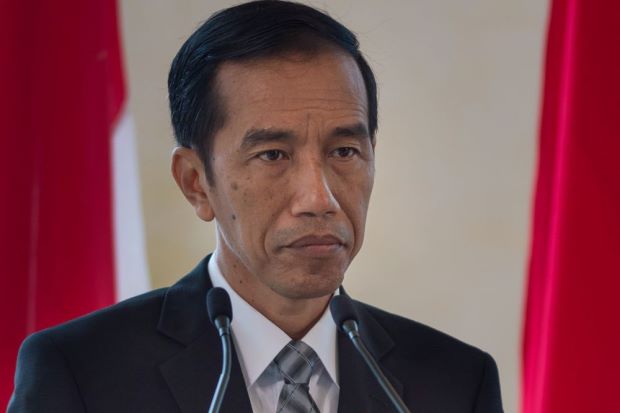In light of the five bombing incidents that took place in the East Java cities of Surabaya and Sidoarjo over the past two days, there have been renewed calls for the House of Representatives (DPR) to pass a bill that would revise the country’s anti-terrorism laws and give authorities more powers aimed at preventing terrorist attacks.
This morning, following the suicide bombing at Surabaya Police HQ, President Joko Widodo briefly addressed the nation to condemn the attacks as well as urge the DPR to pass the anti-terrorism bill in as soon as possible to prevent future attacks.
“The DPR and relevant ministries involved in the revision of the anti-terrorism law, which we put forward two years ago on February 2016, please finalize it as soon as possible, preferably by June because it’s an important legal justification for the National Police to prevent and act against [terrorism],” Jokowi said.
“If by June, at the end of the plenary session, it’s not finalized, then I will issue a Perppu (Government Regulation in Lieu of Law).”
Meanwhile, DPR Speaker Bambang Soesatyo pointed the blame at the government for the bill’s delay, which he said they were ready for ratification in April.
“The DPR was actually 99% ready to finalize it before we went into recess. But the government asked for it to be delayed because there wasn’t an agreement yet on the definition of terrorism,” Bambang said, as quoted by Detik today.
Law no. 15/2003 on Criminal Terrorist Action, which was passed soon after the 2002 Bali bombings, is often criticized for being inadequate in that it largely limits authorities to merely be responsive against attacks. The revisions, proposed after the 2014 Jakarta terrorist attack, would broaden the definition of terrorism and give police the power to detain suspects without trial for longer. The changes would also allow police to arrest people for hate speech or for spreading radical content, as well as those taking part in para-military training or joining proscribed groups.
However, activists have warned that some of the suggested revisions to the anti-terrorism law, such as allowing authorities to wiretap suspected terrorists, goes against the basic principles of human rights and could easily be misused if lawmakers don’t come up with a sufficiently narrow definition for ‘terrorist’.
Suicide bombings took place at three different churches in Surabaya on Sunday morning, killing at least 14 and injuring 42. Investigators believe that a single family (including the father, mother and four children aged 9-18) were behind the attacks and that they were linked to the Surabaya chapter of Jemaah Ansharut Daulah, a terrorist network with links to Islamic State (IS). Officials also believe they were among 500 Indonesians recently returned from Syria who had gone to the Middle East to fight with IS and that they had spent some time with the terrorist group learning about terrorism tactics and bomb making.
Islamic State claimed responsibility for the suicide bombings via its propaganda agency Amaq, calling them “martyrdom attacks”.
Then, at around 9 pm, a homemade bomb prematurely exploded in the neighboring city of Sidoarjo in what the police have disturbingly described as another family affair akin to the Surabaya church bombings. Three were killed in this incident.
On Monday morning, suspected suicide bombers attacked the Surabaya Police HQ. Four of the alleged bombers were killed, while two civilians and four police officers were wounded.




